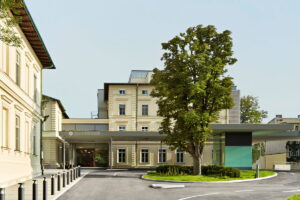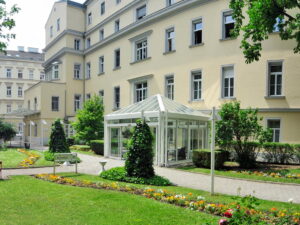Medicine in Austria: Treatment Opportunities in JCI-Accredited Clinics
Austria is renowned not only for its picturesque landscapes and rich cultural heritage but also for its high standard of healthcare. According to the WHO, healthcare expenditures in Austria rank among the highest in Europe.
The life expectancy in Austria surpasses the EU average, standing at 81.2 years (83.8 years for women and 78.6 years for men). Data from the OECD Better Life Index indicate that over 70% of Austrians consider themselves to be in good health and are satisfied with the healthcare system. This underscores the exceptional quality of medical services in the country.
Why Patients Choose Austria for Medical Treatment
Austria attracts patients from all over the world due to its high-quality medical care, well-coordinated healthcare system, and state-of-the-art medical facilities. Each year, approximately 95,000 patients receive treatment at a single university hospital in Vienna, where more than 50,000 surgeries are performed annually.
Five Austrian medical institutions have been accredited by the Joint Commission International (JCI), reflecting the high standard of healthcare and strict adherence to patient rights.
Austria boasts one of the highest ratios of physicians per capita in the European Union, ranking second with 510 doctors per 100,000 residents—well above the European average of 350 per 100,000. This ensures accessibility to medical care and prevents a shortage of specialists.
Austrian Medicine and Innovation
In the realm of medical innovation, Austria continues to lead with remarkable technologies and achievements.
Austria was the first country in the world to develop an artificial leg capable of mimicking natural limb movements and transmitting sensations. This breakthrough was first implemented for Wolfgang, a 54-year-old Austrian who underwent leg amputation. This innovation not only restores patients to active lives but also enables them to engage in sports.
Scientists at the Austrian Academy of Sciences have made significant progress in tissue engineering by creating an artificial heart from stem cells. This organ can contract and possesses unique regenerative properties, opening new avenues for treating heart diseases and rehabilitating patients.
The University of Vienna has contributed to the fight against cancer by developing a new anti-cancer agent, NKP-1338. This ruthenium-based compound selectively targets tumors, inducing programmed cell death and inhibiting the GBR78 protein responsible for cancer cell resistance. This discovery marks a milestone in cancer treatment.
Leading Areas of Medicine
Austrian physicians excel in diagnosing and treating a wide range of medical conditions.
Diagnostics
Many patients travel to Austrian clinics for comprehensive check-ups, which include thorough assessments by specialists such as general practitioners, endocrinologists, gynecologists, or urologists, followed by a detailed consultation to review findings and provide recommendations.
Popular check-up programs in Austria include:
- Basic preventive health check-up
- Oncological screening
- “Healthy Heart” program
- “Women’s Health” and “Men’s Health” programs
- “Healthy Digestive System” program
- “Hormonal Health” program, among others
These check-ups have helped thousands of patients detect chronic diseases early and identify conditions in their nascent stages, often before symptoms manifest.
Urology
In urology, Austrian specialists prioritize minimally invasive treatments. Statistics reveal that over 75% of all surgeries are performed using endoscopic techniques, reducing complications and expediting patient recovery. Robotic surgery is also widely utilized in urology, ensuring precision and minimizing surgical trauma.
A notable innovation in Austrian clinics is convection water vapor thermal therapy using the Rezum system for treating benign prostatic hyperplasia. This minimally invasive procedure uses steam to precisely target and reduce prostate tissue.
For uro-oncological conditions, Austrian clinics successfully employ techniques such as cryoablation, radiofrequency ablation, and chemoembolization.
Orthopedics
As a country famous for winter sports, Austria places significant emphasis on orthopedics and sports traumatology.
Orthopedic specialists focus on both acute and chronic skeletal disorders, treatment of sports injuries, and reconstructive surgeries. They design personalized rehabilitation programs for athletes recovering from intense training and monitor patients during periods of high physical activity.
Orthopedic surgeons are highly skilled in complex reconstructive procedures, such as restoring bones and joints after injuries or addressing congenital abnormalities. Advanced technologies and high-quality microscopes enable surgeons to perform operations with precision, minimizing damage to surrounding tissues.
SPA, Thermal Baths, and Alpine Skiing on Austria’s Slopes
Austria is one of the few countries in Europe where thermal resorts are not just places for relaxation but an integral part of the national healthcare system. These resorts treat respiratory diseases, rheumatic pains, skin conditions, and cardiovascular illnesses. The highlight of Austria’s therapeutic wellness is the combination of radon galleries and mineral springs rich in sulfur, sodium, and calcium. Austrian resorts offer comprehensive therapy programs, including radon baths, inhalations, mud treatments, and physiotherapy under expert supervision. Planning a holiday in Austria? Contact us, we will estimate how much it will cost to book a hotel with a programme.
The main feature of Bad Gastein is its radon galleries, located 2.5 km deep within the mountain rock. The therapeutic effect is achieved through a combination of thermal exposure (with temperatures up to 41°C), high humidity, and natural radon radiation, which stimulates cellular metabolism and reduces inflammation. This therapy helps alleviate pain, improve circulation, and accelerate tissue regeneration. Ready to book a hotel in Bad Gastein? We work directly with the hotel so we always have great deals, leave a request.
Bad Loipersdorf is Austria’s largest thermal resort, specializing in recovery after intense sports training, prolonged physical exertion, and stress. The water here is rich in sodium and magnesium, which is particularly beneficial for joint health. The resort offers intensive rehabilitation programs, including physiotherapy, aqua aerobics, and contrast hydrotherapy. A nighttime thermal zone with soothing lighting and hydro-massage pools makes this resort especially popular.
Langenfeld is the only high-altitude thermal resort in Tyrol, home to natural hot springs and the modern wellness complex Aqua Dome. This thermal center features cascading pools filled with mineral-rich water, Finnish saunas, steam baths, and relaxation areas with panoramic views of the Alps. The water, enriched with sulfates and calcium, strengthens blood vessels and improves skin health. The resort’s distinctive feature is the combination of thermal treatments with mountain air, providing an additional therapeutic effect. We know which hotels have their own medical centres and have developed wellness treatments. Please contact us and we will provide free information on your request.
Bad Blumau is a thermal resort designed by architect Friedensreich Hundertwasser. Its uniqueness lies in its architecture: buildings without sharp corners seamlessly blend into rolling hills, creating an atmosphere of harmony with nature. The local mineral water, rich in sodium and bicarbonate, helps improve skin conditions, relieve nervous tension, and normalize metabolism. The resort offers detox programs, including thermal baths, clay wraps, and hydrotherapy.
Kaprun combines skiing opportunities with thermal recovery. The Tauern Spa offers pools enriched with calcium and magnesium, which help speed up recovery after skiing or long mountain hikes. The resort also features specialized sports programs alternating hot and cold baths to improve circulation and relieve muscle tension. Alpine herb saunas provide inhalation treatments beneficial for the respiratory system. Our collection includes hotels within walking distance of the famous baths and other attractions. Leave a request, and we will find the perfect option for you.
Hospitality Medservice: Your Trusted Partner in Finding the Best Clinics Worldwide. Our platform features only accredited medical facilities equipped with advanced technologies and the latest treatment protocols. Compare clinic standards, meet experienced doctors, evaluate treatment costs, and rely on us to help organize:
- Medical travel
- In-person consultations
- Video consultations
- Second opinions
Submit a request on our website, and our medical coordinator will promptly get in touch with you.



